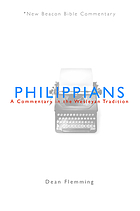 I just finished reading Dean Flemming’s commentary on Philippians in the New Beacon Bible Commentary series. I must admit, going into reading it, I was wondering whether anything in a shorter commentary could impress me. After all, what can anyone say that hasn’t already been said by one of the larger commentaries?
I just finished reading Dean Flemming’s commentary on Philippians in the New Beacon Bible Commentary series. I must admit, going into reading it, I was wondering whether anything in a shorter commentary could impress me. After all, what can anyone say that hasn’t already been said by one of the larger commentaries?
I was pleasantly surprised by Flemming’s work. It is a perfect balance of insight from ancient context, literary observations, theological discussion, and ministry applications. You will not find very many “new” exegetical perspectives or ideas, but the exegetical decisions are reliable and sound. Flemming has a particular appreciation for appealing to the work of Bockmuehl, Fee, and Fowl. Unlike many other commentaries, Flemming does not shy away from useful Patristic quotes and notes on Philippians, especially from Chrysostom.
I would say that this commentary is strongest in the area of how we learn from the text of Philippians in the modern world. Flemming has lots of experience as a missionary and in the local church. And he has forced himself to think about how God’s living word of Philippians is transformative in the journey towards wholeness and holiness (a distinct and welcome Nazarene/Wesleyan focus).
One can also see the impact of Michael J. Gorman on Philippians scholarship in general as Flemming regularly appeals to his work and often uses the language of “cruciformity” and “cruciform.” While Gorman did not invent this language, he has certainly helped to make it a central part of our language of Pauline spirituality and ethics.
One particularly significant dimension of his commentary is the focus on the transformation of the mind and mindset- how Philippians is about seeing the world through new eyes (a view about Paul’s theological interests that I learned from Fowl, A. Munzinger, Lou Martyn, Alex Brown, and Richard Hays).
While this commentary does not say or do it all, it is a welcome contribution and pushes beyond explanation of the text to how the text can come alive and challenge the modern, western Christian.











